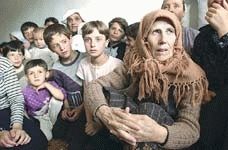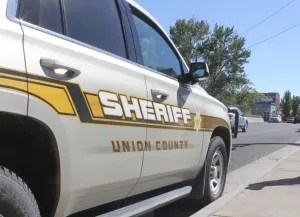LOCAL WOMAN CROSSES THE FRONT LINES IN MACEDONIA
Published 12:00 am Tuesday, June 12, 2001

- TIGHT BONDS: Ethnic Albanian refugees sit huddled amid friends and relatives from Slupcane and Hotle after taking shelter from the shelling that drove them from their homes to a crowded basement room in Lipkovo, Macedonia, on May 16. (Photo/JULIE DENESHA).
Editors note: Arie Farnam of Summerville is working as a freelance writer in Europe. In May she went to Macedonia to do a story on the refugee situation for the Christian Science Monitor. Recently she returned home for a visit and wrote the following account of her experiences for The Observer.
By Arie Farnam
For The Observer
The Red Cross spokeswoman gave concise answers with lots of facts and didnt take sides. I liked her instantly. In the Balkans, truth is as elusive as peace.
In the villages held by the rebels, there are maybe 10,000 civilians hiding in cellars from the shelling, she said. Their situation is deteriorating. There is a threat of starvation. The water has been contaminated because there are a lot of dead animals around, but still the people refuse to leave. There is one village called Lipkovo, which is particularly crowded with refugees.
Photographer Julie Denesha and I were in Skopje, Macedonia, to report on a new Balkan conflict for an American newspaper and the whole idea was making my knees shake.
Since February, the Macedonian army has been hurling mortars at ethnic-Albanian rebels in the mountains just a few miles north of the capital, missing most of the time. In early May, the rebels took control of a group of villages outside the town of Kumanovo and declared a free zone. The government accuses the rebels of using civilians as human shields. The rebels deny the charge.
My editors wanted a refugee story but the refugees were mostly staying put and the big question was why. Were they really hostages?
I suggested to Julie that we try to get into Lipkovo to find out. Julie had been in Kosovo during the bloody aftermath of war two years ago and this was my first real war reporting experience.
Do you have any idea how dangerous it could be? she asked, her eyes narrowing skeptically.
I knew, theoretically. We just need to talk to the refugees, I hedged. We probably wont be allowed through Macedonian lines anyway but I would like to be able to say I at least tried.
The next morning Eljaz, our amiable Albanian interpreter, drove us to Kumanovo. The main road to Lipkovo was closed by the military because it ran too close to heavy fighting. I squinted at a map until I found a back road leading into Lipkovo from the south, so we took that route.
Within a mile we were stopped at a Macedonian checkpoint, fortified with sandbag bunkers. Soldiers gripping machine guns in both hands surrounded us and we surrendered our passports and press accreditation.
I watched Eljaz nervously. He was, after all, on the wrong side. One of the soldiers came forward and barked something at Eljaz and wrenched the door open. He got out of the car, hunching his shoulders defensively. Our breath caught but they only pushed him over to open the trunk. Then, Julie and I were ordered out of the car and soldiers searched our bags, flipping through my notebooks and peering inside Julies camera.
Finally, we were allowed to go. Our mouths went dry as we passed through several eerily empty villages and watched tanks patrolling the fields. Then, we ran into the second Macedonian line.
We gave up our documents again. One of the officers grilled Eljaz, while a dozen soldiers paced around the car. Finally, one of them returned our passports. There are terrorists in these villages. Very dangerous, he said in shaky English. Dont ask us to come help you. You go at your own risk.
Eljaz drove at a crawl into the next village. It was a small Albanian enclave a mile before Matejce, the last village held by the Macedonian army. Beyond Matejce was two miles of no-mans land. Somewhere on the far side of the front lay Lipkovo. Villagers sitting by the road said there was no way the Macedonians would let us through Matejce. Very dangerous! they repeated. Yesterday they beat unconscious a boy who tried to pass.
Julie looked at me with tight lines around her big eyes. Carefully keeping my voice steady, I said, The Macedonians wont shoot at us as long as we are on their side of the line of control. I vote we try to go as far as they let us.
There was a long silence. Finally, Eljaz said, Ill go. Julie nodded and we pulled out of the village and moved cautiously across a mountain meadow.
Suddenly, a car came roaring up behind us. On a hunch, Eljaz flagged it down. Two large men got out and loomed above us. You want to see terrorists? You want to see rebels? one demanded in English.
His words didnt give away which side of this war he was on and there were rumors of Serbian paramilitaries dressed as civilians. My throat wouldnt make a sound but I shook my head vigorously. Finally, Eljaz gathered his courage and spoke to them in Albanian. The tension broke and they clapped each other on the back.
You follow us, the big man said, now grinning. Give us 200 meters lead.
We flew through the meadow and suddenly turned onto a nearly invisible track that disappeared up the side of a rugged hill. We lurked behind hedges, then dropped into a canyon full of dense foliage, forded a small river, scrambled up a steep trail on the other side and passed through several villages, deserted except for a small boy huddled in a doorway. Then, on a flat stretch of road, Julie gasped, Theres the rebel checkpoint! Eljaz slumped back in relief and wiped sweat from his face.
Several men in black uniforms stood blocking the road. The commander demanded our documents, just like the Macedonians. A 15-year-old boy with a Kalashnikov rifle poked his head in our window to check us out and gave a joyous hoot when he saw Eljaz. They clasped hands and laughed out loud. Hes a boy from my neighborhood back in Skopje, Eljaz said in wonder.
Soon we were driving into the village of Lipkovo, unable to believe our luck. We first paid our respects to the local mayor, who introduced himself as Bejzad Iseni and immediately refuted the governments claim that the village was being held hostage by the rebels. While he kept a distance from the fighters, who now occupied his town, he said they were protecting the villages against a massacre by the Macedonian army.
Lipkovo was under siege, with no food allowed in. The government hoped to force the population to leave, so it could defeat the rebels without risking unsightly civilian casualties. But the 15 men sitting around the mayors office fervently swore to stay, even though their families had been hiding in cellars for two weeks, food stocks were running out and epidemics of diarrhea and respiratory illness were spreading,
As we emerged from the town hall, muffled explosions signaled renewed mortar fire in the next village, only a mile and half away. One thousand refugees from the shelling had joined the 3,000 Lipkovo residents hiding in the villages cellars.
We visited Sefedin Iseni, a taxi driver who had taken in 95 refugees. In one room 45 people, mostly women and small children, huddled in the dark. Three infants wailed ceaselessly and the older children stared dully forward, breathing heavily in the rank air.
In the corner women were baking flat bread, from the last of the flour, on a wood stove. Arjeta, a 14-year-old girl, helped carry in wood and then came to talk to me.
The government calls the rebels terrorists, she said, clipping off the words in angry little bits. But they arent terrorists. They are protecting us from government terror. I dont understand why our government is trying to kill its own people.
The villagers were radically supportive of the rebels, but did they really know why their protectors had started a war? The rebels demand better civil rights, education and employment for the 30 percent Albanian minority.
This village has a school up to the eighth grade, which it built without government support, Naser Veseli, a village elder, said. Eight hundred children leave the school every year but there is room for only 60 at high schools in Kumanovo. Just 16 villagers have university education and only four have regular jobs outside their farms.
Many villagers, especially women, have no documents, in effect no citizenship, because the government does not register them.
We have been asking for our rights peacefully in Parliament for 10 years now with no results, he said. It is only natural that young people have taken up arms out of frustration.
It was late afternoon and time for us to head back through the gauntlet of military lines. Three black-clad rebel commanders inspected our car and warned Julie to hide her film so the Macedonians wouldnt get their hands on it.
When we did pass through Macedonian lines, an officer interrogated us about the terrorists. I just shook my head but Julie looked him in the eye and said, I didnt see any terrorists. She meant it.
That night Lipkovo was shelled. On May 24, the army stepped up a major offensive against rebel positions, killing 10 civilians. Now, journalists report that ethnic-Albanian refugees are being tortured and beaten by Macedonian forces.
Now, every time I hear the news, a heavy feeling comes over me so I can barely stand.





